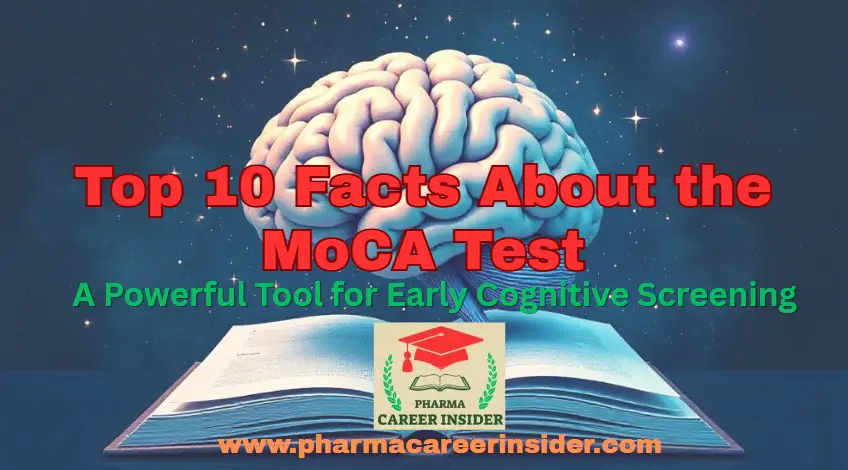The Montreal Cognitive Assessment (MoCA) is a brief cognitive screening tool developed in 1996 by Dr. Ziad Nasreddine in Montreal, Canada. It’s designed to detect mild cognitive impairment (MCI) and early stages of Alzheimer’s disease and other neurocognitive disorders. Unlike other tests that focus mainly on memory, MoCA covers a wide range of cognitive domains.
Developed by doctors, used worldwide, and available in over 100 languages, the MoCA test helps identify people at risk for dementia and other brain-related disorders. This guide explains everything you need to know about the MoCA test—how it works, who should take it, what the scores mean, and much more.

Figure: What is the Montreal Cognitive Assessment Test
What is the Montreal Cognitive Assessment Test (MoCA)?
The Montreal Cognitive Assessment (MoCA) is a quick and widely used screening tool designed to detect mild cognitive impairment (MCI) and early signs of conditions like Alzheimer’s disease and dementia. Developed in 1996 by Dr. Ziad Nasreddine, the MoCA evaluates multiple brain functions—including memory, attention, language, visuospatial skills, and executive function—through a 30-point test that takes just 10 to 15 minutes to complete. It’s more sensitive than similar tests like the MMSE and is used by healthcare professionals worldwide in over 100 languages to support early diagnosis and better patient care.
History and Origin of MoCA
The MoCA test was created in 1996 by Dr. Ziad Nasreddine, a neurologist in Montreal, Canada. He designed it to spot mild cognitive impairment (MCI)—the stage between normal aging and dementia. Before MoCA, most healthcare professionals used the Mini-Mental State Examination (MMSE). However, MMSE wasn’t sensitive enough to pick up subtle memory and thinking problems. That’s where MoCA came in. It quickly gained popularity for being more thorough without taking much time.
Why is the MoCA test important?
The MoCA test plays a crucial role in:
- Early diagnosis of dementia and Alzheimer’s disease
- Screening individuals with memory complaints
- Monitoring cognitive function over time
- Differentiating between normal aging and cognitive decline
Early detection through the MoCA test allows for timely medical interventions, which may delay disease progression.

Purpose of the MoCA Test
The MoCA test is used for:
- Detecting mild cognitive impairment
- Screening for Alzheimer’s disease
- Monitoring dementia progression
- Evaluating cognitive impact of stroke, Parkinson’s disease, multiple sclerosis, and brain injury
- Supporting clinical trials and research studies
It gives doctors an early warning signal when someone’s brain function changes, even before full-blown symptoms appear.
Who Should Take the MoCA Test?
- Adults aged 55 and older experiencing memory lapses
- Patients with a family history of dementia or Alzheimer’s
- People recovering from stroke or traumatic brain injury
- Individuals with Parkinson’s disease, Multiple Sclerosis, or Huntington’s disease
- Anyone suspected of having cognitive impairment
While it’s not a diagnostic tool on its own, MoCA helps identify patients who need further evaluation.
Domains Assessed in the MoCA Test
The test looks at seven areas of brain function. Each section is short but designed to test specific thinking skills.
| Cognitive Domain | Task Example | Points |
| Visuospatial/Executive | Drawing a clock, connecting numbers/letters | 5 |
| Naming | Naming animals shown in pictures | 3 |
| Memory | Recalling 5 words after a delay | 5 |
| Attention | Repeating numbers, subtracting by 7s | 6 |
| Language | Repeating phrases, word fluency | 3 |
| Abstraction | Explaining similarities (e.g., apple-orange) | 2 |
| Orientation | Knowing the date, location, city | 6 |
Total Score = 30 Points
A score of 26 or higher is usually considered normal.
How the MoCA Test is Administered
The test is short and simple, taking about 10 to 15 minutes. It can be done:
- In-person using paper and pen
- Online via video call (telehealth)
- In over 100 different languages
Only trained and certified healthcare professionals (doctors, nurses, and psychologists) are allowed to administer it officially. Since September 2020, they also need to complete a short certification course to use it.
Scoring System and Interpretation
| Score Range | What It Means |
| 26–30 | Normal brain function |
| 18–25 | Mild cognitive impairment (MCI) |
| 10–17 | Moderate cognitive decline |
| Below 10 | Severe cognitive impairment |
Important: If someone has 12 years of education or less, doctors add 1 extra extrapoint to adjust for educational background.
MoCA vs. MMSE (Mini-Mental State Examination)
Many people ask, “Why not just use the MMSE?” Here’s how the two tests compare:
| Feature | MoCA | MMSE |
| Cognitive skills tested | 7 areas | 5 areas |
| Best for detecting | Early MCI | Moderate to severe dementia |
| Time to complete | 10–15 minutes | 5–10 minutes |
| Sensitivity (detect changes) | Higher | Lower |
| Max score | 30 | 30 |
MoCA is better when you need to catch problems early, especially in younger seniors.
Certification & Official Use
To make sure results are consistent and accurate, MoCA certification is now mandatory for clinicians. Here’s how it works:
- Visit the official website: www.mocatest.org
- Complete a short online training course
- Pay a one-time fee (around $125)
- Receive a license to administer and interpret the test
This ensures that healthcare providers understand how to give the test properly and avoid mistakes.
MoCA and Mild Cognitive Impairment (MCI)
Mild Cognitive Impairment (MCI) means that someone’s memory or thinking is worse than normal for their age—but not bad enough to be dementia. People with MCI often know something’s wrong, but they can still live independently.
How MoCA Helps
MoCA is designed to spot the signs of MCI before they get worse. It’s especially useful in:
- People over 55
- Stroke survivors
- Patients with family history of Alzheimer’s
- Those who feel “off” mentally but pass basic memory tests
Studies show that early testing helps doctors slow down or even reverse the course of cognitive problems with the right care and attention.
Digital Tools and Online MoCA Calculators
For clinicians, digital tools like the MoCA Calculator on MDCalc help:
- Record and score tests quickly
- Save time during patient appointments
- Reduce human errors
While the test itself isn’t fully self-administered online, these tools support faster, more reliable assessment in hospitals and clinics.

Limitations and Considerations
The MoCA test is powerful, but it’s not perfect. Here are some things to keep in mind:
- It doesn’t diagnose dementia on its own. It’s a screening tool.
- People with low education or who are not fluent in the test language might score poorly.
- Anxiety, stress, or poor hearing can affect results.
- It may give false positives—showing issues where there are none.
That’s why healthcare providers use MoCA along with interviews, medical history, imaging, and other cognitive tests.
Final Thoughts: The Role of MoCA in Cognitive Health
The Montreal Cognitive Assessment Test is more than just a paper quiz. It’s a vital tool that gives doctors—and patients—a head start in spotting early brain changes. Whether it’s mild forgetfulness or something more serious, early detection leads to better care.
If you or someone you love is showing signs of memory loss, don’t wait. Talk to a doctor about taking the MoCA test. It’s quick, safe, and could make a huge difference in your quality of life.
You can access and download the official Montreal Cognitive Assessment (MoCA) test in PDF format from the following sources:
- Full post montreal cognitive assessment pdf, montreal cognitive assessment (moca), montreal cognitive assessment test, download this link:
- MoCA Version 8.3 (English): This is the latest version of the MoCA test, suitable for clinical use.
- MoCA Version 8.1 (English): An earlier version of the MoCA test, still widely used in various settings.
- MoCA Version 7.1 (English)
This version includes both the test and detailed administration instructions.
For additional information, translations, and official certification details, you can visit the official MoCA website:
If you need assistance with interpreting the test or understanding the scoring system, feel free to ask!
Frequently Asked Questions (FAQs)
Q1. How often should someone take the MoCA test?
Answer: Most doctors recommend a checkup every 6 to 12 months if cognitive decline is suspected or being monitored.
Q2. Can you practice or study for the MoCA?
Answer: No. The test is meant to show natural brain function. Practicing may give a false result.
Q3. Does the MoCA test replace a full memory exam?
Answer: No. It’s a first step, not a full diagnosis.
Q4. Can it be taken from home?
Answer: Yes—there’s a remote version of the MoCA that doctors can give over a video call.
Q5. Is the MoCA test covered by insurance?
Answer: In many countries, yes, especially when done in a clinical setting. Always check with your provider.
🔗 Useful Links




